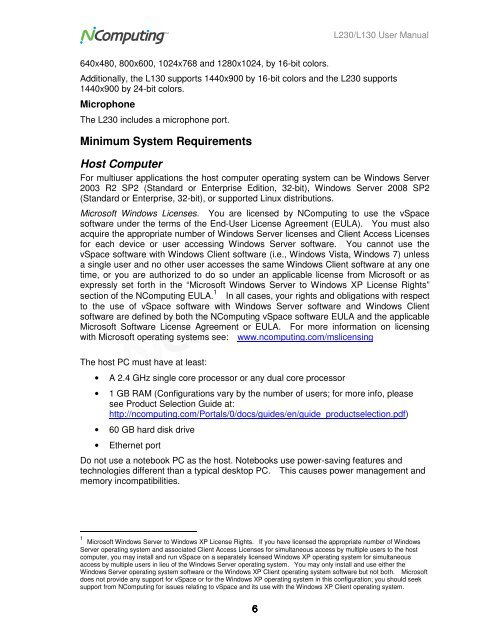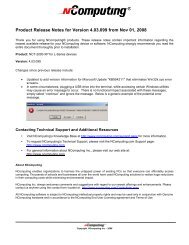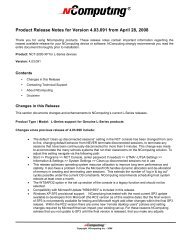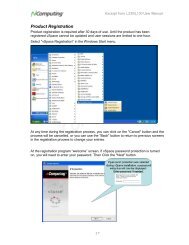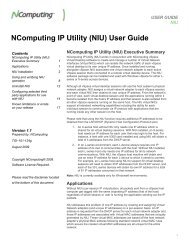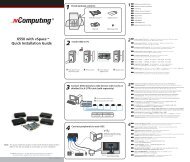L230 and L130 Access Devices with vSpaceTM User Guide
L230 and L130 Access Devices with vSpaceTM User Guide
L230 and L130 Access Devices with vSpaceTM User Guide
You also want an ePaper? Increase the reach of your titles
YUMPU automatically turns print PDFs into web optimized ePapers that Google loves.
<strong>L230</strong>/<strong>L130</strong> <strong>User</strong> Manual<br />
640x480, 800x600, 1024x768 <strong>and</strong> 1280x1024, by 16-bit colors.<br />
Additionally, the <strong>L130</strong> supports 1440x900 by 16-bit colors <strong>and</strong> the <strong>L230</strong> supports<br />
1440x900 by 24-bit colors.<br />
Microphone<br />
The <strong>L230</strong> includes a microphone port.<br />
Minimum System Requirements<br />
Host Computer<br />
For multiuser applications the host computer operating system can be Windows Server<br />
2003 R2 SP2 (St<strong>and</strong>ard or Enterprise Edition, 32-bit), Windows Server 2008 SP2<br />
(St<strong>and</strong>ard or Enterprise, 32-bit), or supported Linux distributions.<br />
Microsoft Windows Licenses. You are licensed by NComputing to use the vSpace<br />
software under the terms of the End-<strong>User</strong> License Agreement (EULA). You must also<br />
acquire the appropriate number of Windows Server licenses <strong>and</strong> Client <strong>Access</strong> Licenses<br />
for each device or user accessing Windows Server software. You cannot use the<br />
vSpace software <strong>with</strong> Windows Client software (i.e., Windows Vista, Windows 7) unless<br />
a single user <strong>and</strong> no other user accesses the same Windows Client software at any one<br />
time, or you are authorized to do so under an applicable license from Microsoft or as<br />
expressly set forth in the “Microsoft Windows Server to Windows XP License Rights”<br />
section of the NComputing EULA. 1 In all cases, your rights <strong>and</strong> obligations <strong>with</strong> respect<br />
to the use of vSpace software <strong>with</strong> Windows Server software <strong>and</strong> Windows Client<br />
software are defined by both the NComputing vSpace software EULA <strong>and</strong> the applicable<br />
Microsoft Software License Agreement or EULA. For more information on licensing<br />
<strong>with</strong> Microsoft operating systems see: www.ncomputing.com/mslicensing<br />
The host PC must have at least:<br />
• A 2.4 GHz single core processor or any dual core processor<br />
• 1 GB RAM (Configurations vary by the number of users; for more info, please<br />
see Product Selection <strong>Guide</strong> at:<br />
http://ncomputing.com/Portals/0/docs/guides/en/guide_productselection.pdf)<br />
• 60 GB hard disk drive<br />
• Ethernet port<br />
Do not use a notebook PC as the host. Notebooks use power-saving features <strong>and</strong><br />
technologies different than a typical desktop PC. This causes power management <strong>and</strong><br />
memory incompatibilities.<br />
1 Microsoft Windows Server to Windows XP License Rights. If you have licensed the appropriate number of Windows<br />
Server operating system <strong>and</strong> associated Client <strong>Access</strong> Licenses for simultaneous access by multiple users to the host<br />
computer, you may install <strong>and</strong> run vSpace on a separately licensed Windows XP operating system for simultaneous<br />
access by multiple users in lieu of the Windows Server operating system. You may only install <strong>and</strong> use either the<br />
Windows Server operating system software or the Windows XP Client operating system software but not both. Microsoft<br />
does not provide any support for vSpace or for the Windows XP operating system in this configuration; you should seek<br />
support from NComputing for issues relating to vSpace <strong>and</strong> its use <strong>with</strong> the Windows XP Client operating system.<br />
6


